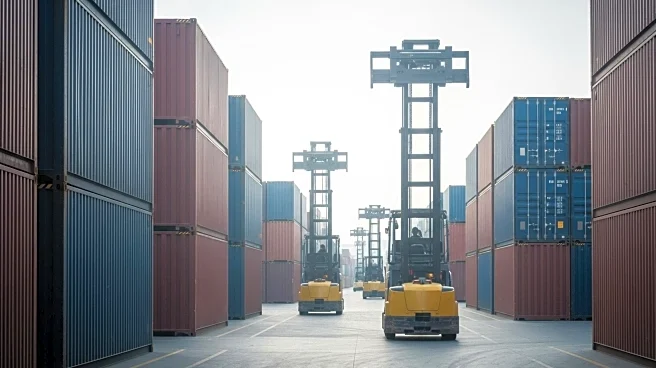What's Happening?
The logistics industry is increasingly adopting Yard Management Systems (YMS) to improve efficiency in supply chain operations. According to Simon Tunstall, senior research director at Gartner, Inc., interest in YMS is growing across various sectors, including retail, consumer goods, and manufacturing. Companies are moving away from manual yard management processes, which often lead to inefficiencies and delays, and are instead implementing automated solutions such as check-in/check-out systems and dock scheduling tools. These systems provide real-time visibility into trailer status, gate activity, and yard asset location, helping to reduce demurrage and detention charges and streamline operations. The adoption of YMS is seen as a critical step in addressing challenges like yard congestion, labor shortages, and lack of real-time visibility.
Why It's Important?
The shift towards Yard Management Systems is significant for the logistics industry as it addresses longstanding inefficiencies in yard operations. By enhancing visibility and control, YMS can reduce operational costs and improve supply chain reliability. This transition is crucial for industries facing labor shortages and increased demand for faster delivery times. Companies that adopt YMS can gain a competitive edge by optimizing their logistics processes, reducing delays, and improving customer satisfaction. The integration of advanced technologies such as AI-enabled vision tools further enhances the capabilities of YMS, offering more comprehensive solutions for complex logistics networks. As more companies recognize the strategic importance of efficient yard operations, the adoption of YMS is likely to become a standard practice in the industry.
What's Next?
As the adoption of Yard Management Systems continues to grow, companies are expected to further integrate these systems with existing logistics platforms like Warehouse Management Systems (WMS) and Transportation Management Systems (TMS). This integration will provide a more cohesive approach to managing supply chain operations. Additionally, the development of more advanced functionalities within YMS, such as AI-driven analytics and real-time asset tracking, will likely drive further innovation in the logistics sector. Companies may also explore partnerships with technology providers to enhance their YMS capabilities, ensuring they remain competitive in a rapidly evolving market. The focus will be on creating more connected and responsive yard environments that support broader supply chain efficiency.
Beyond the Headlines
The adoption of Yard Management Systems not only impacts operational efficiency but also has broader implications for sustainability in logistics. By optimizing yard operations, companies can reduce fuel consumption and emissions associated with idle trailers and inefficient routing. This aligns with the industry's growing emphasis on environmental responsibility and the push towards carbon-neutral logistics practices. Furthermore, the shift towards automated systems may influence workforce dynamics, requiring employees to adapt to new technologies and processes. As companies invest in YMS, they must also consider the training and development of their workforce to ensure successful implementation and utilization of these systems.









